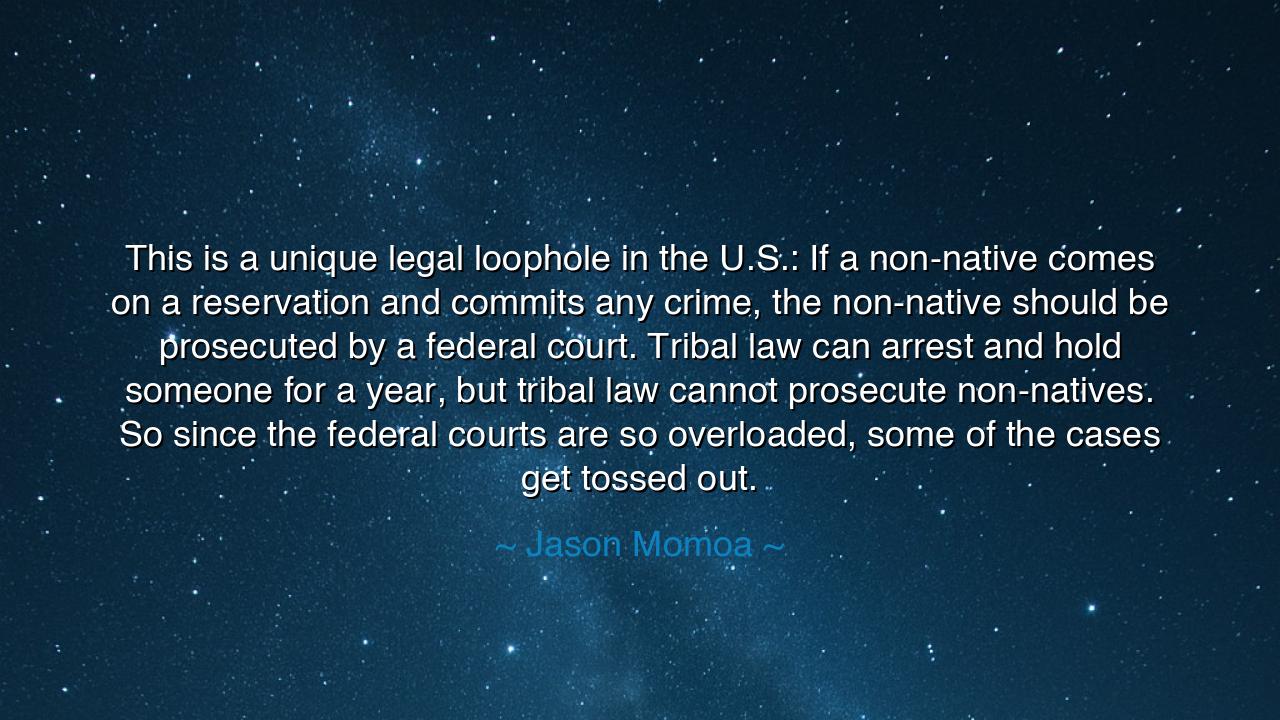
This is a unique legal loophole in the U.S.: If a non-native
This is a unique legal loophole in the U.S.: If a non-native comes on a reservation and commits any crime, the non-native should be prosecuted by a federal court. Tribal law can arrest and hold someone for a year, but tribal law cannot prosecute non-natives. So since the federal courts are so overloaded, some of the cases get tossed out.






The words of Jason Momoa, spoken with the gravity of one who honors his ancestral roots, reveal a wound hidden deep within the laws of the United States: “This is a unique legal loophole in the U.S.: If a non-native comes on a reservation and commits any crime, the non-native should be prosecuted by a federal court. Tribal law can arrest and hold someone for a year, but tribal law cannot prosecute non-natives. So since the federal courts are so overloaded, some of the cases get tossed out.” In these words, he exposes not only a flaw in law, but a fracture in justice itself, where the sovereignty of Native nations is diminished, and the safety of their people left vulnerable.
At the heart of his statement lies the paradox of tribal sovereignty. Tribes are recognized as nations within a nation, keepers of their own laws, traditions, and justice. Yet, through the weight of federal policy, their powers have been curbed. They may arrest, but they may not prosecute a non-native who commits harm on their land. In this contradiction, the dignity of sovereignty is both acknowledged and denied. It is sovereignty with shackles, a shadow of what it was meant to be.
History bears witness to the origins of this injustice. In 1883, the U.S. Supreme Court’s decision in Ex parte Crow Dog recognized a tribe’s authority to govern crimes committed among its own members. But soon after, the Major Crimes Act of 1885 stripped tribes of much of that authority, placing serious crimes under federal jurisdiction. Over time, further laws and rulings eroded tribal power to punish non-natives, leaving Native lands exposed to exploitation. Momoa’s words echo this long history, a chain of decisions that placed Native peoples in the care of others, while denying them the full right to defend themselves.
The tragedy of this legal loophole is not abstract. It is lived in the stories of women who suffer violence at the hands of outsiders, yet see their cases dismissed because federal courts are overwhelmed. It is lived in the frustration of tribal police, who may detain but cannot deliver full justice. And it is lived in the grief of families who know that harm has been done, but that the law, twisted by limitation, has left the wrong unpunished. These are not the failings of tribal law, but of a system that cripples it.
There is a deep moral lesson here: justice delayed or denied is not justice at all. When cases are “tossed out” because courts are burdened, when tribes are forbidden from prosecuting crimes on their own soil, then law becomes not the protector of the people but a weapon of neglect. Such neglect breeds mistrust, despair, and anger, for what is sovereignty worth if it cannot shield the vulnerable? What is law worth if it does not serve those it claims to protect?
The story is not without hope, for in recent years, laws such as the Violence Against Women Act (VAWA) have begun to restore some tribal authority, granting limited powers to prosecute non-natives for crimes like domestic violence. Yet the work remains unfinished. The loophole Momoa names continues to wound, reminding us that justice is a living promise, one that must be renewed and defended. To restore power to tribal nations is not to diminish the Union, but to strengthen it, by honoring the dignity of its first peoples.
Therefore, children of tomorrow, take this teaching to heart: when laws are written, let them not only protect the powerful, but empower the vulnerable. Honor sovereignty not in name only, but in practice, so that no community is left defenseless by the very system that claims to serve it. If you would walk in justice, then walk with those whose voices have been silenced, and labor to mend the fractures of law. For the health of a nation is measured not by how it treats the strong, but by how faithfully it safeguards those who stand on its margins. And in this labor, you will walk the path of true justice.






AAdministratorAdministrator
Welcome, honored guests. Please leave a comment, we will respond soon